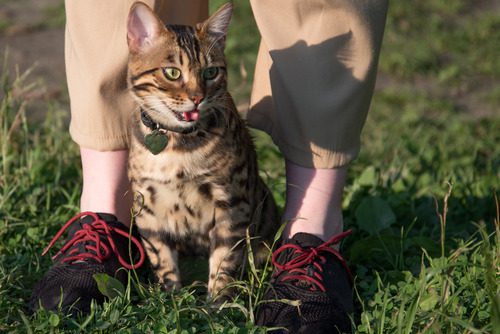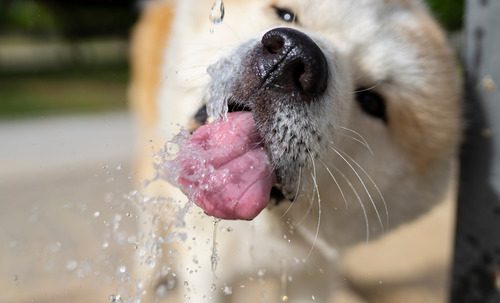8 Possible Reasons for Your Dog’s Shaking
If you’ve ever noticed your dog shaking and wondered why, you’re not alone. Many pet owners find themselves puzzled by this behavior. In this blog, we’ll explore the various reasons why dogs shake, ranging from the benign to those warranting a closer look by a veterinarian. If you’re concerned about your dog’s shaking, we encourage you to reach out to your nearest Heart + Paw facility. Our team is ready to provide more information and help schedule an appointment for your pet.

1. Feeling Cold: A Common Cause
Just like humans, dogs can shiver when they feel cold. Smaller breeds or dogs with thinner coats are particularly sensitive to lower temperatures. Keeping your dog warm with blankets or a doggy sweater can help, especially in the cooler months. If your dog continues to shiver despite being warm, it could be a sign of hypothermia or some other condition that warrants a veterinary exam.
2. Fear or Anxiety: Emotional Responses
When dogs are scared or anxious, shaking can be a natural response. This might occur during thunderstorms, fireworks, or when entering new environments. It can help to observe the circumstances leading to your dog’s shaking so you can take steps to prevent it.
Creating a comforting environment, like a quiet space with your pet’s favorite toys or blanket, can help. Consistent, gentle reassurance and behavior training can also reduce anxiety. If these steps don’t seem to help, or if the anxiety appears severe, it’s a good idea to seek advice from a veterinarian or a pet behaviorist. They can offer strategies tailored to your dog’s needs, ensuring their emotional well-being.
3. Excitement: A Joyful Quiver
Shaking from excitement is common in dogs. You might see this when you return home or during playtime. This form of shaking is usually harmless and shows your dog’s happiness and enthusiasm. Recognizing the difference between excitement and stress-related shaking is key to understanding your dog’s emotional state and keeping them happy.
4. Medical Conditions: When to Be Concerned
Shaking in dogs can sometimes indicate an underlying health problem. Conditions like pain, nausea, or neurological disorders are among the most common medical reasons for shaking. If you notice other signs such as reluctance to move, loss of appetite, or changes in bathroom habits, these could also be red flags. Consistent or severe shaking, especially if it’s a new behavior, warrants a prompt veterinary visit. Timely diagnosis and treatment are important for managing any health issues your dog may be facing. Remember, your vet is your best resource for understanding and addressing any medical concerns your dog may have.
5. Age-Related Shaking: Understanding Senior Dogs
Senior dogs often experience shaking as part of the aging process. This can be due to joint pain, muscle weakness, or even neurological changes as they age. Check in with your veterinarian regularly to monitor these age-related changes. Your vet might suggest supplements or medications to ease your pet’s joint pain or manage other age-related conditions. It’s also important to maintain a comfortable living space for your senior dog, with easy access to their bed, food, and water. While some shaking is normal in older dogs, abrupt or severe shaking should be assessed to rule out more serious conditions.
6. Breed-Specific Tendencies: Genetic Factors
Certain dog breeds have a natural tendency to shake more than others. Small breeds like Chihuahuas, for instance, are known for this. It’s thought to be part of their genetic makeup. In contrast, larger breeds might shake less frequently. Understanding your dog’s breed characteristics can help you distinguish normal behavior from something genuinely unusual. However, if you observe shaking that seems out of the ordinary for your dog’s breed, or if it’s accompanied by other symptoms, a veterinary visit is a smart step.
7. Overexertion: Physical Stress
Dogs can also shake after intense physical activity. This is usually due to muscle fatigue or overexertion. Make sure your dog gets adequate rest and hydration after vigorous exercise. If shaking after exercise is a regular occurrence, it may be worth discussing with your vet.
8. Reaction to Medication: Side Effects
Some medications can cause side effects like shaking in dogs. This can occur with certain types of drugs, including those for pain, seizures, or allergies. If your dog starts a new medication and begins shaking, notify your vet. They can determine whether the medication is the cause and may adjust the dosage or switch to a different medication if necessary. Follow your vet’s instructions and do not stop any medication without their guidance.
Do You Have More Health-Related Questions About Your Pet?
Reach out to Heart + Paw for guidance. We’re here to help you and your dog on every step of your journey together. For more information or to schedule an appointment, locate the Heart + Paw hospital nearest you and give us a call!
Recent Posts
Signs Your Cat Could Have Anxiety
When you think of anxiety, you might not immediately associate it with cats. However, our feline friends…
Is My Pet Alright? When Cat Panting Requires a Vet Visit
Caring for our cats means paying attention to all the little details that make them unique. One…
7 Plants Toxic to Cats that Could be in Your Home or Garden
Creating a safe and inviting space for our beloved cats often involves more than just providing them…
Dog Tooth Abscesses: Signs, Causes, Treatment and Prevention
When it comes to keeping your dog happy and healthy, oral health plays a significant role that…
Why Is My Dog Always Thirsty and Drinking a Lot of Water?
If you’ve noticed your dog lapping up more water than usual, you might be wondering if it’s…
About Us
Heart + Paw was founded in 2018 by Chief Veterinary Officer Dr. George Melillo, who currently serves the Mid-Atlantic area. Heart + Paw offers a combination of veterinary care, pet grooming, and dog daycare to help be a resource in your pet parenthood journey.
We'd Love to Meet Your Four-Legged Friends
Find out how the friendly veterinary team at your local Heart + Paw can help your pets live longer, healthier lives by searching for a location near you.





